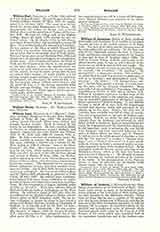

William of Auxerre, a thirteenth-century theologian and professor at the University of Paris. William’s name occurs in many of the pontifical documents relating to the University of Paris dating from the first decades of the thirteenth century. From these we learn that he was a magister at the university, that he was archdeacon of Beauvais, and that he was one of the three theologians appointed in 1231 by Gregory IX to prepare an amended edition of the physical and metaphysical works of Aristotle which had been placed under a ban by the Council of 1210 because of the errors which were contained both in the inaccurate translations and in the Arabian commentaries accompanying them. Apparently this work of correction was done in Rome; a letter of Gregory IX to King Louis, dated May 6, 1231, recommends William of Auxerre to the French king and says that the Parisian teacher has labored “at the Apostolic See, for the reformation of study”. William is the author of a work entitled “Summa Aurea“, which is not, as it is sometimes described, a mere compendium of the “Books of Sentences” by Peter the Lombard. Both in method and in content it shows a considerable amount of originality, although, like all the Summce of the early thirteenth century, it is influenced by the manner and method of the Lombard. The teacher by whom William was most profoundly influenced was Praepositinus, or Prevostin, of Cremona, Chancellor of the University of Paris from 1206 to 1209. The names of teacher and pupil are mentioned in the same sentence by St. Thomas: Hcec est opinio Praepositini et Autissiodorensis (in I Sent., XV, q. 111). William was, in turn, the teacher of the Dominican, John of Treviso, one of the first theologians of the Order of Preachers. The importance of the “Summa Aurea” is enhanced by the fact that it was one of the first Summae composed after the introduction of the metaphysical and physical treatises of Aristotle. The work was published at Paris in 1500. Another edition, without date, by Regnault, is mentioned by Grabmann.
WILLIAM TURNER

